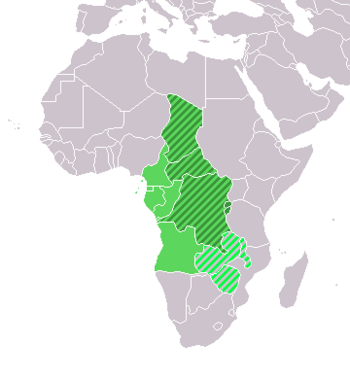Central Africa

Central Africa is a core region of the African continent often considered to include Burundi, the Central African Republic, Chad, Democratic Republic of the Congo, and Rwanda.
Middle Africa (as used by the United Nations when categorising geographic subregions) is an analogous term that describes the portion of Africa south of the Sahara Desert, east of Western Africa, but west of the Great Rift Valley.[1] The region is dominated by the Congo River and its tributaries, which collectively drain a greater area than any river system except the Amazon. According to the UN, the nine countries of Middle Africa are Angola, Cameroon, Central African Republic, Chad, Democratic Republic of the Congo, Republic of the Congo, Equatorial Guinea, Gabon, and São Tomé and Príncipe.[2] All of the states in the UN subregion of Middle Africa, plus those otherwise commonly reckoned in central Africa (11 states in total), comprise the Economic Community of Central African States (ECCAS).[3]
The Central African Federation (1953–1963), also called the Federation of Rhodesia and Nyasaland, was made up of what are now the nations of Malawi, Zambia, and Zimbabwe. Similarly, the Anglican Church of the Province of Central Africa covers dioceses in Botswana, Malawi, Zambia and Zimbabwe. These states are now typically regarded as parts of Southern Africa or Eastern Africa. [4]
Climate
Much of Africa's Atlantic coast has a humid tropical climate.It is wet and warm all year. This climate supports a large, dense tropical rain forest.North and south of the Congo Basin are large areas with a tropical savanna climate.Those areas are warm all year ,but have distinct dry and wet seasons.Only in the high eastern mountains is there highland climate.Dry steppe and even desert climates are found in the far south.
See also
- British Central Africa Protectorate (1891–1907)
- French Equatorial Africa
- East Africa
- North Africa
- Southern Africa
- Subsaharan Africa
- History of Central Africa
References
- ↑ "World Macro Regions and Components". United Nations (2000). Retrieved on 2007-12-16.
- ↑ "World Macro Regions and Components". United Nations (2000). Retrieved on 2007-12-16.
- ↑ "Economic Community of Central African States". Africa-Union.org (2007). Retrieved on 2007-12-16.
- ↑ "The Central African Federation". Encyclopedia Britannica (2007). Retrieved on 2007-12-16.
|
||||||||||||||||||||||||||||||||||||